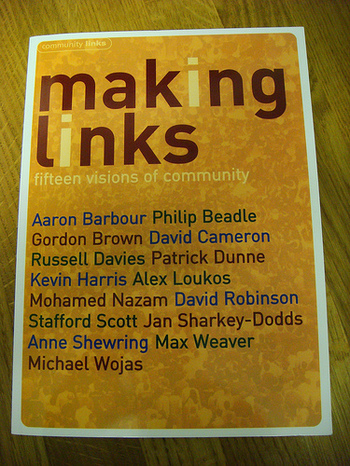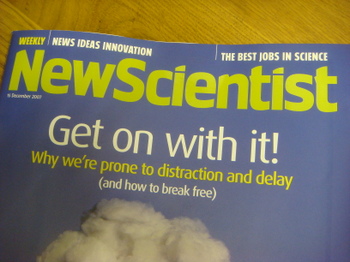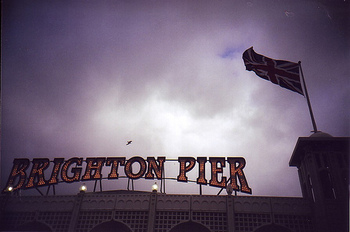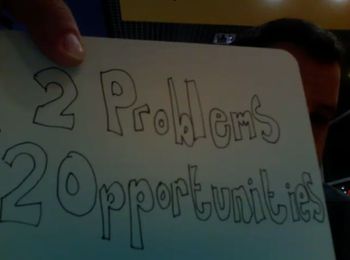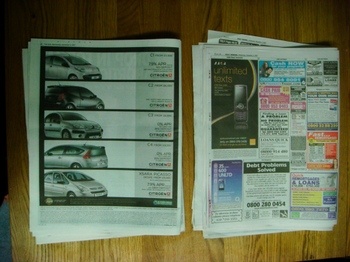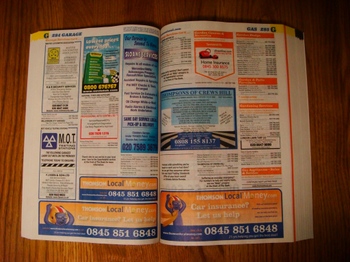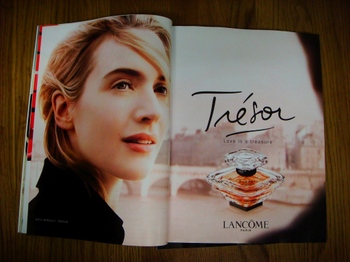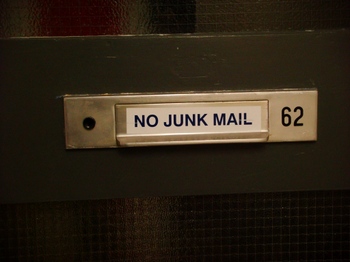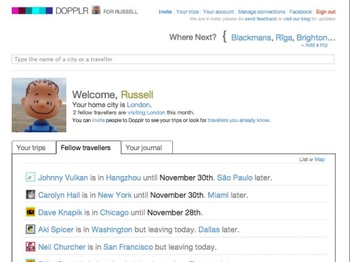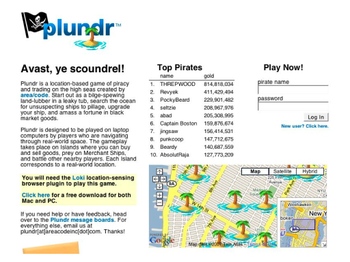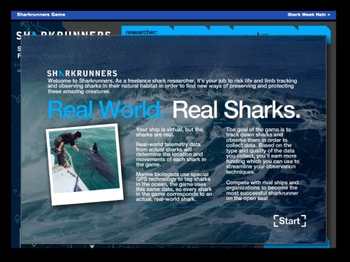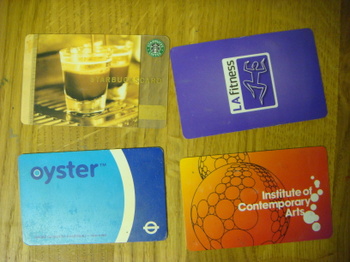Russell Davies
As disappointed as you are
About | Feed | Archive | Findings | This blog by email
« November 2007 | Main | January 2008 »
happy etc
December 22, 2007 in diary | Permalink | Comments (1) | TrackBack (0)
nintendomas
Our Nintendo decorations have arrived and are filling out the collection nicely. I wonder why Nintendo haven't put Mario in a red cloak, he'd make a good Santa. They've more rights to co-opt Christmas than Coke have. And thanks to Alice for the tip.
December 21, 2007 in huh? | Permalink | Comments (2) | TrackBack (0)
community links
Anne and I found ourselves in illustrious company recently; within the pages of this publication celebrating 30 years of Community Links. I'm obviously biased but I think Anne's piece about being a governor of a city centre school is rather brilliant - and as a special Christmassy bonus you can get a pdf of it here. If that makes you want to read more you can get the whole book here for only £10.99. I'd especially recommend the Kevin Harris piece on the sociability of dog-walking.
December 20, 2007 in writing | Permalink | Comments (0) | TrackBack (0)
so you want to be an anthropologist
Grant has posted a fascinating anthropological essay question. With an actual cash prize. If you fancy proving your anthropological mettle this would be a good place to start.
December 19, 2007 in thinking | Permalink | Comments (0) | TrackBack (0)
ironically...
December 18, 2007 in huh? | Permalink | Comments (1) | TrackBack (0)
conference research
Big thanks for all the conference suggestions; via the blog, email and stopping me in the street. Here's a rough list of the ones that I'm liking the look of so far. I can't possibly go to all of these but I like thinking that I might. And I'm hoping some other, more random choices will poke their way in too.
The first one doesn't even have a date or a venue yet, but it's a fantastic idea, so whenever and wherever it is I'll be there: geeKyoto. And I'm very keen on these two science festivals - Liverpool in September and Cheltenham in June. Then everyone's been so enthusiastic about ReBoot, that seems a must. And there's been equal enthusiasm for LIFT, so maybe that'll replace ETech. I guess I have to decide that quite quickly, might already be too late. And all that's not cheap. And not forgetting dConstruct.
Mostly based on the website Port Eliot seems the most appealing literary thing so far, though there are no details for 2008. (It was in July in 2007. UPDATE: It seems it won't be happening in 2008. Shame.) I'm also hoping that London Lit Plus will happen again because that looked fantastic last time and I didn't get to go to any of it.
I think the Liverpool Biennial has to go on the list (September). I went to see Bill Drummond talk at Tate Liverpool at the end of the summer and he foreshadowed the biennial rather nicely. Be good to follow through. And I saw about the Asian Art Triennial in Manchester in April (on Chris's handy list of biennials). That looks interesting, since I'm unlikely to get to Asia at any point next year. I'm also intrigued to see what a Bucharest Biennial would be like, since the Romanians do everthing else with such aplomb. (May-June). Lauren's also persuading me to think about Ars Electronica too. (Especially since they invited me to enter 'coffee morning' in the competition this year.) It's in September though. Everything seems to be in September.
The delicious specificity of this chocolate festival has much to recommend it, but I'm not sure I like chocolate that much. The Abergavenny Food Festival seems more like it. It's a fantastic part of the world, and I was told today of a man who makes gourmet and experimental scotch eggs who exhibits there, so I must go. (It's also September, hmmm, September might be busy.)
I think Futuresonic has to go on the list (May, Manchester). And I suspect I'd enjoy Museums And The Web but it might be a bit far for me. TeachMeet (January 11, London, eek!) looks good too. I'll sign up for that. (I think I might go to BETT anyway, for the C4 stuff.)
All of which suggests that I could maybe give the big, structured things a miss (the TEDs, Poptechs, IdeaCities). Not that I could afford them. I think I'll have more fun cobbling a more random schedule together myself.
Which brings me to my final beg - can anyone suggest anything more random and unexpected? I'd like to peek inside other worlds and industries. Spread my wings a bit further afield. And that's hard stuff to google for if you don't even know where to start. I liked Bobbie's suggestion of the conference for the funfair/attractions industry in Orlando but I think I'd find it hard to justify the distance/frivolity ratio.
Is there anything else out there? Does anyone have any hobbies that would yield an interesting conference? Angling? Whittling? It's hard to ask for because I don't know what I'm after. But something, you know, different. Otherwise I might resort to random trade publications. Anyway, thanks for your indulgence and suggestions. Keep em coming.
December 17, 2007 in interesting | Permalink | Comments (8) | TrackBack (0)
widgety goodness 1 - intro and desire
I went to Brighton the other week to talk at Ivan's widgety goodness thing. It wasn't on the pier unfortunately but it was still rather splendid.
I've found myself mostly doing the same presentation all year, which has become slightly depressing, so I was grateful for the opportunity to think of something different to say. It meant though that it was a bit woolly, because I can never really work out what I think until I've started saying it and it takes a few runs through for it to come together, but I think there was some stuff in there worth writing down. The problem of course with writing down your presentation is that it gets a bit leaden on the page, as opposed to the stage. And very long. So I've divided it into four posts. So here we go:
I had to confess to being a little uncertain about what widgets actually were. And I was glad to know it wasn't just me, always everyone speaking spent some time offering a definition. I know that widgets are those things on the right of m'blog, little windows of content from elsewhere but, talking to Ivan, it was clear that he also wanted to embrace the whole idea of mashing things up, of social software and things like Facebook Apps, and of the commercial possibilities for all that. Will widgets kill advertising? All that kind of stuff. So, in the absence of having any larger point I thought I'd talk about two problems for the widget industry that occurred to me, and two opportunities.
Problem One is about value creation versus value extraction, and what's going to be differentiating and therefore, er, valuable.
It's clear that online/digital is going to fundamentally change marketing communications. It's going to destroy any advertising type that's primarily concerned with deals, timeliness, functionality, availability and that kind of thing. Anything to do with information will be replaced by digital stuff's ability to get more of the right kind of information to the right kind of people more quickly. Classified. Finance ads. Sale information. Directories. All of that will be devoured by clever code, good data and mobile phones. And whoever gets that rightest, soonest will make huge buckets of money.
But I'm not so sure it'll replace this stuff. The stuff that acts to add ideas and images to things. (I'm starting to think of this as 'pre-experience design' but that's a post for another day.) How will this perfect world of social advertising sell me perfume? Because perfume is the perfect example of a mostly information-free product, a product that's built almost entirely from imagery, association and ideas. Certainly a widget on my phone might tell me that a particular brand is on sale as I pass a retailer, and a community widget might tell me 60% of my friends on Facebook use a particular fragrance and I guess you could even do something with a flickr widget and show me pictures that remind all sorts of people of a particular scent or something. But I don't think you can replicate that old-fashioned brand stuff of connecting ideas and images to things. And though I'm firmly convinced that all sorts of media vehicles will be killed by our keen-ness to not watch loads of crap ads I don't think things like Vogue are going anywhere either. Because they're the vehicle for this kind of stuff. And there's something about a physical magazine.
This, of course, runs counter to the conventional online advertising dream that when everyone's empowered with perfect information and sharing everything with their community then all the branding con-artists will be out of a job. Or more likely they'll be lined up against the SuperWall and shot, just after the PR people and Andrew Keen. But I'm think that's one of those techno-utopian singularities that won't come to pass. There's this notion that attaching imagery, ideas and stories to a product is somehow a trick and that once we're all sufficiently melded with our technology we'll awaken from our idiocy and only buy things based on the material cost of goods. Or something. Anyway. I don't think we live in that rational a world. People like buying things that embody ideas wrapped around a physical product, and that they'll pay extra for that. And that that's fun and good.
But I could be wrong. I'm not that committed to this point, I mostly need it to so there's Two Problems to balance out the Two Opportunities. Let's not waste any more time on it. This is going to be long enough as it is.
This is Part One of a very long thing four-part thing. (1, 2, 3, 4)
December 17, 2007 in presentations | Permalink | Comments (2) | TrackBack (0)
widgety goodness 2 - the uncanny valley
This next point, I'm more committed to. I think it's more fundamentally problematic.
There's a hypothesis in robotics known as the Uncanny Valley. My crude version of it would be this: the more human robots get the more we like them, until they get a bit too human, at which point they begin to freak us out. (The idea of the valley becomes clear if you draw a graph of empathy versus realism. Have a look at the wikipedia entry, you'll see what I mean.) This does seem to be happening in 3D graphics which are starting to get realistic enough to be unsettling. The reason it's a valley rather than a cliff is the idea that eventually robots'll get so good that they'll be human enough for us not to care and we'll like them again. But since no-one's built a robot that good (AS FAR AS WE KNOW) we can't tell about that yet.
Why do I mention this? Because I think Facebook Beacon and the like have just plunged us over the edge into the relationship marketing Uncanny Valley. I've talked about this before here and here, but it might be worth having another tilt at it. From a different angle.
Whenever you talk about the future of perfectly targeted advertising this scene from Minority Report comes up. It apparently captures nirvana for advertisers; the ability to precisely identify and perfectly direct persuasive commercial messages at a particular individual. Let's ponder for a minute what a misguided bit of futurology this is.
1. Where's His Pop-Up Blocker?
He's an elite psi-detective or something. You're telling me he can't get hold of some open source future firefox ambient ad blocker thingy?
2. Where's The Societal Push-back?
OK. Maybe he's in an awful future where such resistance isn't tolerated. I can't remember. But this would never be allowed in the real world. Society is pushing back the boundaries of advertising all the time, through legislation and social and commercial pressure. The EU would never allow this. It'll probably get piloted in Time Square (like that ridiculous directed sound thing) and then abandoned as egregious urban spam.
3. What About The Standard Of Creativity?
One thing I know to be true. If advertising's going to survive in any form then it has to get much, much better. And those ads there are typically cliched, un-imaginative streams of nonsense. I can't believe they'd invest all that money in corneal recognition and not spring for some decent creative. Especially as they're presumably getting real time tracking telling them all these ads have failed.
4. They're Just Shouting His Name
Yup. With all their genius and precise targeting this is all they can manage to do. Shout his name. In the obviously crass manner beloved of direct mail - Dear Your Name. That, at least, feels true. But is this the best that future marketing can do? Because let's face it, when that's the only thing an organisation has to do, it can seldom even get that right.
If the idea that more information equals more relevance equals great value for customers made sense to people then they'd be calling up DM agencies and offering them all sorts of extra information about themselves. I suspect that's not happening.
Much of the march towards the uncanny valley is because of our horribly sloppy use of language. We behave and talk as though large corporations are going to have genuine, authentic relationships with people. As though they're going to be actual friends. This is palpably never going to be the case. Corporations should of course be honest, respectful, enthusiastic etc etc in their dealings with me. To do otherwise would be stupid. But they're never going to convince me that they're a person, and they shouldn't try to be too much like a person. Which is probably why this stuff is getting so grating. Richard's written more and cleverer thoughts about this here. But I'll return to the robotics metaphor and my usual level of superficiality to suggest that the video below represents the level of humanity to which brands should aspire.
This is Part Two of a very long thing four-part thing. (1, 2, 3, 4)
December 17, 2007 in presentations | Permalink | Comments (1) | TrackBack (0)
widgety goodness 3 - meaning and fun
Right. That's the two problems. Maybe not huge, but worth thinking about. Let's look at opportunities.
Before we start let me say that I'm fully signed up for the idea of brand utility. It is far, far better for brands to spend money on useful services for their customers rather than annoying them with pointless and insulting ads. Absolutely. 100%. In fact I'm probably one of those guilty of going overboard in favour of brand utility because we're ashamed of how useful and pointless most 'brand communications' are. I'm also conscious that it might be a little soon to start a brand utility backlash given very, very few brands have actually done anything with the idea yet. Most of them haven't even started thinking about it.
So let's assume that we're a few years on from now, when every smart brand has built all kinds of useful services into their marketing, incorporating helpful advice and utility for their customers served up by discrete and elegant widgets. Good. Hurrah. Well done. Only problem. Isn't this is a little bit boring? 'Brand utility '- the clue's in the name. It's a utility, it's not very exciting. And, again, I don't want to offend the rational massive, but I think we might need (and want) to do a little more than that.
And Wattson, Dopplr and Plundr point at what I mean.
You'll have probably heard about the Wattson before. It monitors you're electricity usage and lets you know, in real time, in an accessible ambient way how much you're using. And, when they get the companion software and community working properly, it'll let you compare yourself with other people and homes. This seems, to me, to be more than just utility, this seems to be taking information that was perfectly accessible to you before - you could have worked it all out from your electricity bill - and presenting it to you in a way that makes it more meaningful. Not just more useful. Does that make sense? Or is that pushing things too far?
Or maybe Dopplr's a better example. It's built out of very mundane information - just your travel plans. And it does a very simple thing - share that with people. So you could use it as a great example of brand utility. I have done. I've cited it quite often as the perfect thing that an airline mileage company should have done, the perfect example of a missed opportunity for a brand utility. But the more I think about it the more I don't think that's true. Because Dopplr isn't really about travel plans; it's about friendship and serendipity. (I don't think it's coincidence that it was built by a group of friends.) There's a difference there, it's about more than information. It's about something bigger. And I suspect that if an airline had built it it'd wouldn't have been made with the kind of attention and love that gives you something as elegant as dopplr. And that's not just an aesthetic after thought, that's part of how the meaning arrives.
And that seems like a big opportunity for the widgetygoodness business. If there's a way to go beyond the exchange of information and create some additional meaning for people, that'd be good. If you're using my data to make a widget I want you to do more than just help me buy stuff, I want you to generate something meaningful for me.
Or, failing that, what about making stuff that takes my information and lets me play with it.
Plundr is a game built by area/code. (Only works in the States unfortunately.) When you connect to a wifi network it works out where you are and either tells you you're on a particular pirate island, or let's you name and claim your own island. And then, if there's anyone else playing plundr on that network you can fight their pirate ship with your pirate ship. Or, you can fight some automated ships or trade between networks. It's incredibly simple but it's silly and captivating and fun. It's basically plazes plus fun. Plazes is great. Useful. Kind of interesting. I use it. I'm just not quite sure why. Plundr takes my behaviour and makes play out of it. That seems like something we can learn from.
Area/code have also made Sharkrunners. It's a game built to promote yet another Shark Week on Discovery. You play the part of a marine biologist, chasing about looking for sharks, learning about them as you go. So far, so slightly predictable. But the bit that makes it almost magic is that you're chasing real sharks, it's based on actual live shark data from GPS-enabled sharks. That gives it a whole other dimension. It seems more meaningful because it's more real. And you're not just showing me information, you're letting me play with it.
Imagine if Tesco thought about the clubcard the same way. Imagine if it was a game you could play. Or if you could sign up for an Oyster game which rewarded the person who'd travelled the most on the network each day, or had made the fastest trip between stations. Or something. You know. You can imagine. Think of all the data we all generate all day. Not just online, in the real world. When you take that data and try and sell me stuff it freaks me out, maybe it wouldn't be so bad if you let me play with it. Imagine a Passively Multiplayer game built out of loyalty and membership card data.
As Dan points out in his InterestingSouth talk, we can generate both meaning and fun out of real world data. And we should. There's nothing wrong, and there's something joyful about entertainment built on a service.
This is Part Three of a very long thing four-part thing. (1, 2, 3, 4)
December 17, 2007 in presentations | Permalink | Comments (2) | TrackBack (0)





